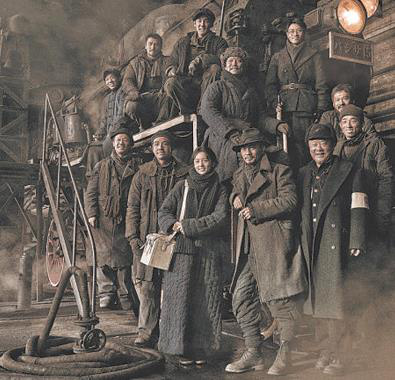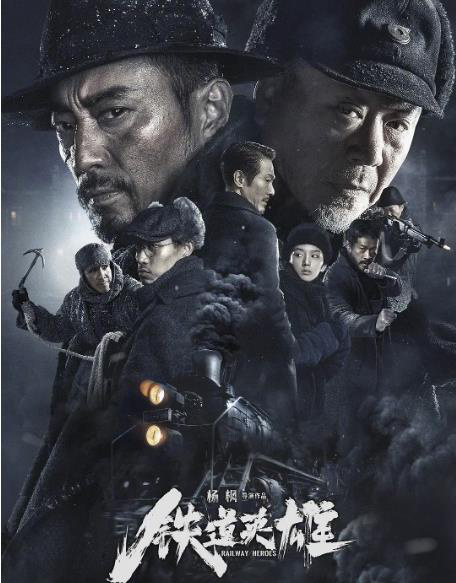Railway Hero, a just epic against imperialist aggression.
Original title: an anti-genre blockbuster

In recent years, the industrial production level of new mainstream blockbusters is booming, and they are constantly trying to combine with genre films, which not only serves the construction of values, but also provides a rich audio-visual feast for the audience. Against the background of the centenary of the founding of the Party this year, the film "Railway Hero" is neither a remake nor a stylized reappearance of historical events. Instead, it has written a just epic of the people of North China uniting against imperialist aggression in War of Resistance against Japanese Aggression period through emotional clues of many characters, such as Lao Hong, a hero of the railway team, Lao Wang, a civilian hero dispatcher, Xiaozhuang, an ordinary nurse, and Shi, a railway engineer.

??Type blockbuster and anti-type
The film has successfully integrated a variety of Hollywood film industry aesthetics and genre styles, such as westerns, war films, film noir, spy films, etc., especially in the battle paragraphs played by Lao Hong. In order to support the anti-Japanese struggle in the mountains and destroy the railway logistics supply line of the Japanese army, Lao Hong sneaked into the freight car alone at night and intercepted the enemy’s supplies. This scene gave the audience a feeling of being separated from the world when Zorro appeared in the snowstorm in the north. In the shoot-out scene in the trailer, Lao Hong’s 38 big cover is no longer inserted obliquely under the front, but fitted to the right waist, lifting the elegant skirt. When the right hand touches the gun at the waist, the elbow is lifted backwards in a straight line, and the shadow of the western cowboy can be seen everywhere in the coherent action of instantaneous firing at the waist. However, when the audience really walks into the theater with the expectation of watching blockbusters, there will be more or less psychological gap. These gaps are clearly reflected in the brief comments of online movies and the comments of video up owners — — "This film is not enough!" "The war scene is not intense enough!" .
Railway Hero is an anti-genre blockbuster. The film shows a rebellious spirit everywhere from the ontological level: on the surface, it seems to obey the rules of Hollywood genre films, wandering on the edge of westerns, war films and film noir, but the core is completely opposite — — The hero finally dies with the enemy; Teenagers have no mother since childhood, and their father disappeared in the mine disaster, which leads to the lack of soil for Oedipus plot; The prince was not driven by Libido to avenge his "father"; Lao Hong, a tough hero, is not an omnipotent savior, and there is no hero to save the United States. There are not many female appearances, and the nurse Xiaozhuang has not become a hero’s drag bottle; The finale of the film is not a happy ending … … All kinds of signs point to a kind of resistance, which integrates all the visual and auditory elements that all types of films should have in plastic arts, but it is completely different from Hollywood types in narrative. This undoubtedly angered some genre audiences, but almost every audience who expected genre through visual styles, posters and trailers, after venting their genre desires, invariably talked about the emotional connection between the main characters of the film and them.
??The highlight of the anti-type genre film
Anti-genre blockbusters jump out of the single-line narrative pattern of single-genre films, and at the same time provide a visual overview, more themes, elements and characters are organically integrated into a film. Movies wander among various film types, subtly interspersed with the film memory of "four depth of field" of war history — — The leadership of the Party organization, the heroic individual’s fighting, the selfless struggle of civilian heroes, and the war sufferings and struggles of ordinary China people. This "quadruple depth of field" varies among "motion-image", history, war epic and people as the main body, and outlines the historical moment of China people’s resistance to the Japanese war of aggression. Through the emotional focus and variation of the narrative of "four depth of field", the film shows Chinese’s heroism and dignity, and also shows the unyielding and fearless national character of the people of China in the historical "original land" of resisting the war of aggression.
In addition, this narrative method provides more possibilities for exploring the emotional space of characters. Anti-Japanese War movies are different from other movies. Apart from jumping out of Zizek’s so-called "Lacan inside and outside Hollywood" personal desire routine, movies not only resist a Hollywood-style narrative abuse, but also resist an Oedipus syndrome at the film ontology level, becoming a richer emotional space. This kind of space used to be regarded as the reserved place for literary films, art films or independent films. Railway Hero not only depicts the cruelty of the war and the bravery of the hero, but also shows the cruel, painful, nervous and sad focus of the people in North China during the war with more tender brushwork. The "warmth fable" in this kind of war elegy is delicately unfolded in the story line of the young railway worker Stone.
??艺术作为反抗,电影作为记忆
??《铁道英雄》由反类型的情感叙事进入艺术创作的场域,进而通过“四重”线索的交叠带领观众重回华北反法西斯战争历史时刻的情感“原境”。电影将平民英雄的抵抗与普通民众的挣扎同样纳入英雄叙事的创作,在时间与影像的互相作用下,电影重新揭示的正是法国艺术史学家迪迪·于贝尔曼所谓的“记忆的灼痛”。在这里,电影不再仅仅是媒介技术进步带给我们的一种感官刺激,而是一种艺术创作的抵抗,既反帝国主义、反侵略,也反俄狄浦斯、反好莱坞。也许正如法国当代后现代主义哲学家德勒兹在《电影I》中说:“艺术就是抵抗本身”。(作者:栗琳,系北京大学艺术理论博士研究生、美国杜克大学历史学硕士、香港浸会大学电影电视与数码媒体艺术硕士)